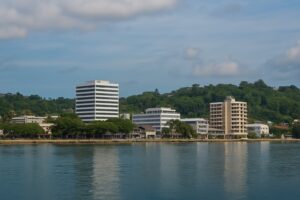Vanuatu’s Urgent Plea: Mobilizing Global Investment to Combat Climate Crisis
Vanuatu stands on the frontline of the global climate crisis, advocating for substantial investment and international cooperation to combat the adverse effects of environmental change. This article explores the insights shared by Ralph Regenvanu, Vanuatu’ Climate Change Special Envoy, during an interview on ABC’s Pacific Beat. It highlights the financial needs, the impacts of global shipping emissions, and the importance of resilience and adaptation strategies for Vanuatu and similarly vulnerable nations.
The Financial Imperative for Climate Resilience
Ralph Regenvanu’s assertion that “we need trillions of dollars” to fund climate resilience initiatives underscores the gravity and scale of the challenge. The Pacific islands, including Vanuatu, face severe threats from climate change, such as rising sea levels, more frequent and intense natural disasters, and changing weather patterns. These environmental threats also pose significant economic and social risks.
Vanuatu’s economy, heavily reliant on agriculture and tourism, is particularly vulnerable. The devastation wrought by Cyclone Pam in 2015 showcased the country’s infrastructural vulnerabilities and the urgent need for robust climate resilience measures to safeguard its future.
Global Shipping Emissions: A Significant Concern
The shipping industry, a lesser-known source of global greenhouse gas emissions, contributes approximately three percent to the worldwide emissions total. Recent measures by the International Maritime Organization (IMO), including the implementation of a global carbon price for shipping companies, mark a progressive step towards curbing these emissions. However, for nations like Vanuatu, the dual threat of global warming and environmental degradation from shipping emissions calls for even stricter regulations and enhanced international collaboration.
Enhancing Climate Resilience and Adaptation
The trillions of dollars Regenvanu refers to are not just for mitigation but also for supporting adaptation and resilience projects in vulnerable regions like Vanuatu. The nation is proactive in launching initiatives aimed at sustainable agriculture, disaster risk reduction, and the preservation of vital natural ecosystems, including mangroves and coral reefs.
These critical projects, however, face financial limitations. It is essential for international funding to support these efforts, ensuring their sustainability and effectiveness in the long term.
The Crucial Role of International Cooperation and Funding
The challenges posed by climate change cannot be addressed by Vanuatu or similar island nations alone. International treaties, such as the Paris Agreement, alongside funding mechanisms like the Green Climate Fund, play pivotal roles in mobilizing the necessary financial resources.
The urgency of the situation, as highlighted by Regenvanu, calls for increased global commitments. Financial support and significant policy shifts are imperative to assist nations like Vanuatu in adapting to an ever-changing climate landscape.
Key Insights and Data
- Financial Requirements: Ralph Regenvanu emphasizes the need for trillions in funding to bolster climate resilience in the Pacific.
- Shipping Emissions Impact: The global shipping industry, responsible for about three percent of total greenhouse gas emissions, now faces a global carbon tax.
- Climate Vulnerability: Pacific nations, including Vanuatu, are highly susceptible to climate change effects such as rising sea levels and severe weather events.
- Infrastructure Risks: Events like Cyclone Pam in 2015 highlight the significant risks to Vanuatu’s infrastructure from climate-related disasters.
- Adaptation Efforts: Vanuatu is advancing various climate adaptation projects, but these require substantial financial backing to be effective.
- Need for Global Cooperation: International agreements and financial support are crucial for fostering climate resilience in vulnerable countries.
In conclusion, Vanuatu’s urgent call for climate action underscores a global imperative. Significant financial investment, combined with strong international cooperation and policy reform, is essential to build resilience in vulnerable countries like Vanuatu. The insights from leaders like Ralph Regenvanu are crucial reminders of the immediate actions needed to safeguard our planet for future generations.










